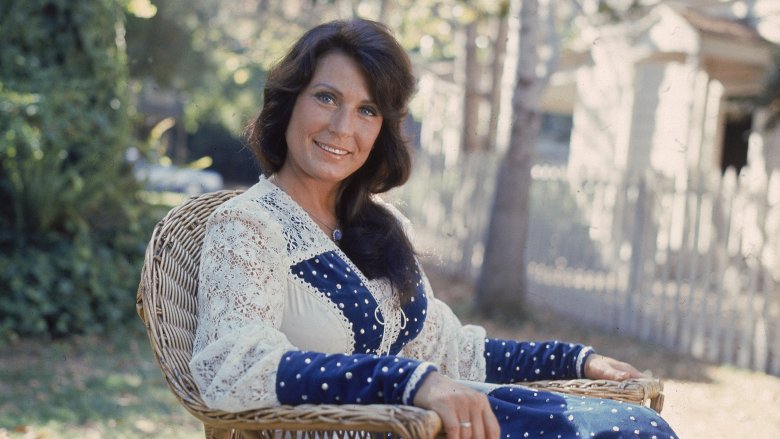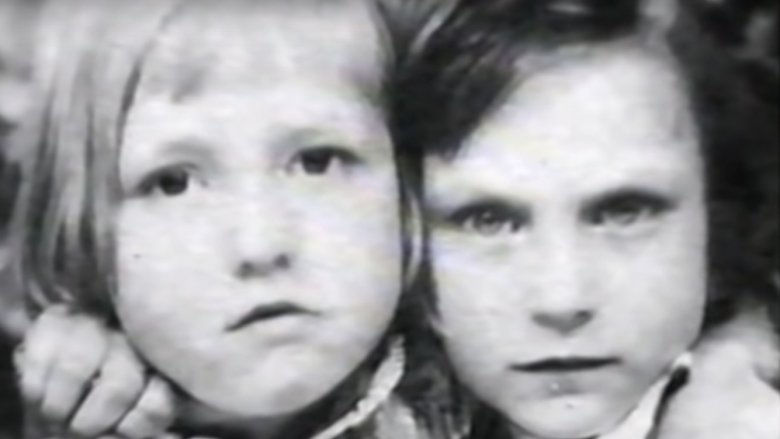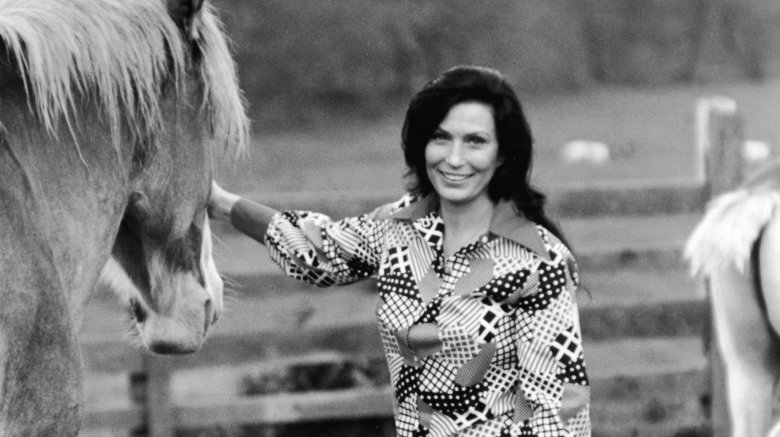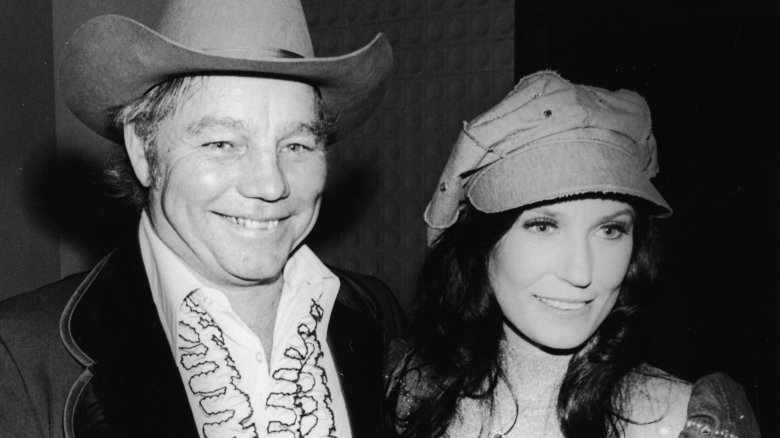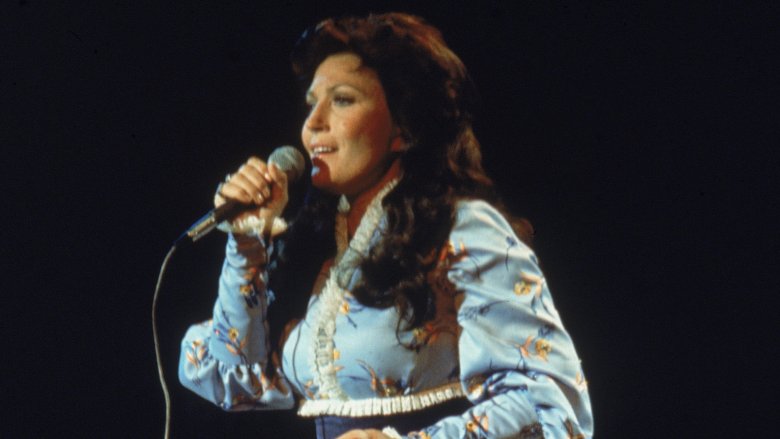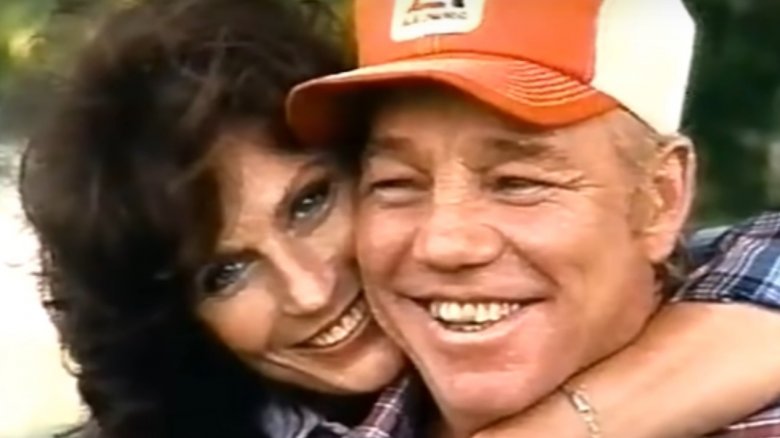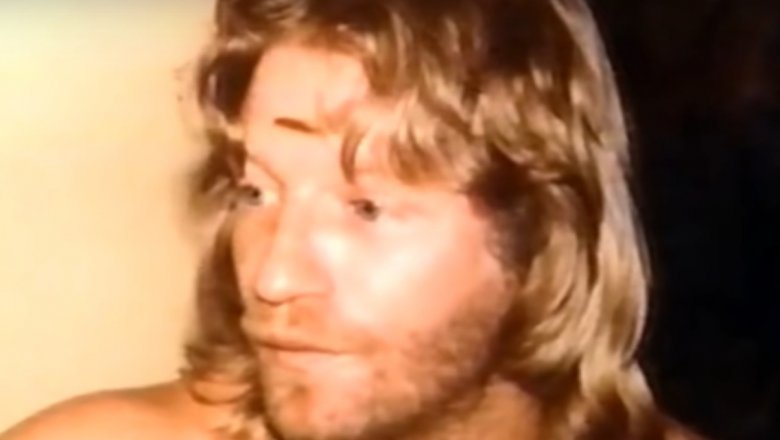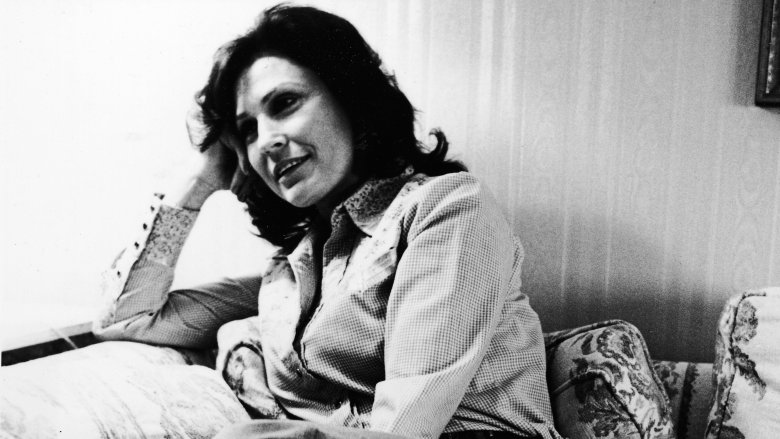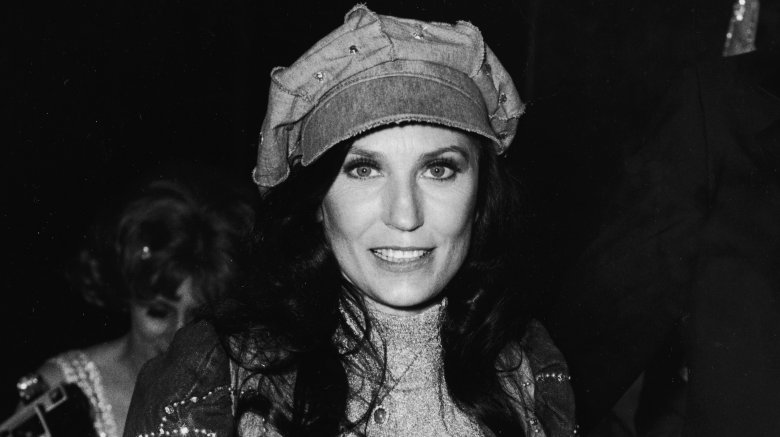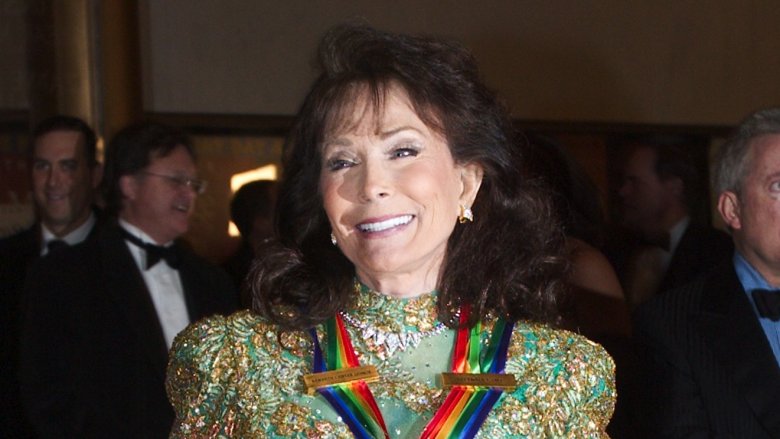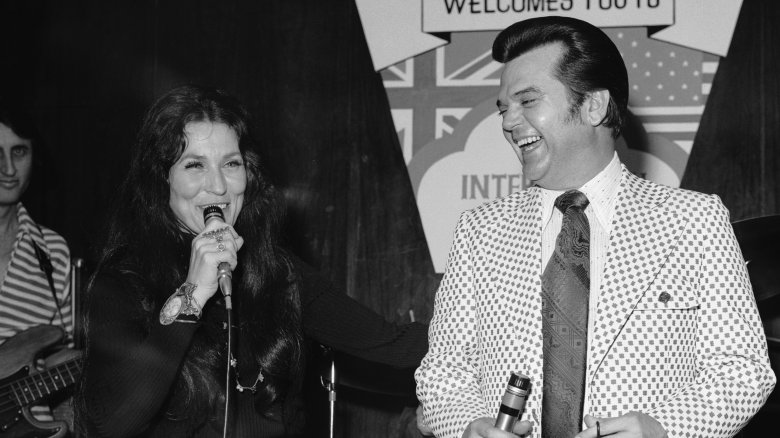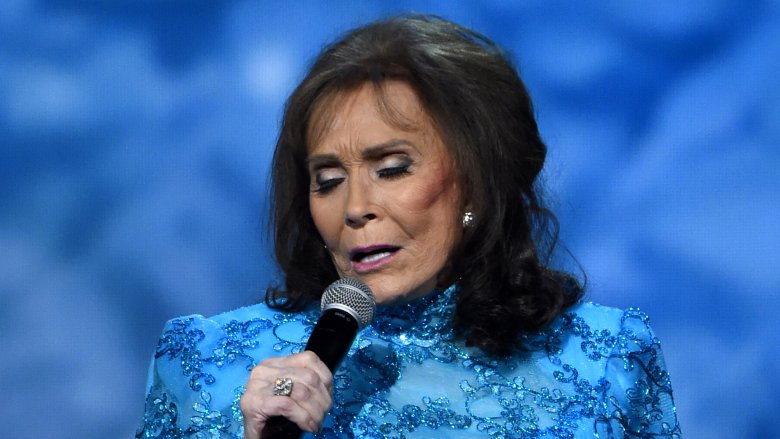Loretta Lynn's Tragic Real Life Story
When people wax nostalgic about the golden age of country music, they inevitably get around to talking about Loretta Lynn, the self-described coal miner's daughter from Butcher Holler, Kentucky, who, in her roughly seven decades of songwriting and singing, racked up 16 #1 hits including "Don't Come Home A-Drinkin' (With Lovin' on Your Mind)," "Fist City," and "Feelins'," helping change country music from a male-dominated genre to one that welcomes and embraces women's voices.
Her songs have spoken to people from all walks of life, probably because every song she's written has come in large part from her own experience. Women in particular see in Lynn as a kindred spirit, a refreshingly candid ally in a world that often seems to favor men, especially those of the hard-drinkin,' hard-livin' variety. And she has found a loyal audience in both rural and urban America, where people were obviously itching for her unique take on hardship and triumph.
You might think that fame, not to mention the money and adoration that came with it, would have brought Loretta Lynn happiness, but what many casual country fans don't know is that Loretta Lynn's life was far from perfect. In fact, it has been marred by loneliness and tragedy and loss, and, not one to waste time feeling sorry for herself, she has worked hard to put all that heartache right back into her art.
Loretta Lynn was dirt poor but proud of it
Loretta Lynn isn't shy about what it was like to grow up the impoverished daughter of a coal miner in Butcher Holler, Kentucky. The second of eight children born to Ted and Clara Webb, Loretta wore old flour sacks to church and school and often went barefoot. Going to bed hungry was normal. Going without was simply a way of life. Lynn's early childhood years coincided with the Great Depression, so nearly everyone around her was poor and in need of clothing, food, and stable shelter.
The Webbs lived in a one-room home with no electricity, no running water, and no indoor toilet. Clara Webb decorated the walls of the house with pages she tore from magazines. That's where Clara got Loretta's name: She thought Loretta Young, the actress known for the film The Farmer's Daughter, was especially beautiful and kept a photo of her over her daughter's crib.
There wasn't much to do in Butcher Holler except socialize with the neighboring families, keep the house running and clean, watch babies, and go to church. What the Lynn family's lifestyle lacked in excitement and worldly wealth, though, it more than made up for in love, and, in her best-selling autobiography Coal Miner's Daughter, Loretta Lynn claims that being poor made her strong, self-sufficient, and capable of fighting life's many battles on her own.
Loretta Lynn was Daddy's little girl
Growing up, Loretta Lynn worshiped her tender, coal miner father, Ted Webb. Webb loved his children unconditionally — incidentally, Loretta's sister, Crystal Gale, is also a country music legend — and Loretta's confidence in his affection and love helped her through many a difficult time. In Coal Miner's Daughter, she writes, "I feel like Daddy's been the most important person in my life. ... I had almost fourteen years of Daddy giving me love and security, the way a daddy should. ... Daddy is the main reason I always had respect for myself when times got tough between me and Doolittle. I always knew my daddy loved me."
Loretta Lynn's husband, Oliver "Mooney" "Doolittle" Lynn, made two promises to Ted when he married Loretta against her father's wishes. First, he said he would never physically harm her. Second, he promised not take her away from her family. He quickly broke both promises. On their wedding night, he beat Loretta for jokingly calling him a whore, and then he dragged her all the way to Washington state to work in the logging camps.
Loretta Lynn was in Washington when Ted Webb died of a stroke at 51. The loss was almost impossible to bear. Loretta was overwhelmed with guilt and grief. Her Christian faith, though, helped her survive that loss, and it would get her through many more losses in the years to come.
As a child bride, Loretta Lynn learned the hard way
Loretta Webb met Oliver "Mooney" Lynn at a pie auction in Butcher Holler. The auction was intended to raise money for the local school, but it was also by way of a matchmaking activity. Mooney, straight from the Army and smitten with Loretta's fresh-faced, brunette beauty, bid on her pie and walked her home. Loretta fell hard and fast for Mooney, a charmer with a flair for the romantic who also had a reputation for being both a drinker and a womanizer.
Four months later and in direct conflict with her loving parents' wishes, Loretta agreed to marry Mooney. She was just 15 years old, and Mooney was 21. According to Loretta Lynn's book Coal Miner's Daughter, she was only 13 when Mooney carried her across the proverbial threshold, but the Associated Press accessed Lynn's birth certificate and corrected the record in 2012. Regardless, she was obviously too young to know what lay in store for her: heartbreak, financial struggles, and six kids.
The first of those children, Betty Sue, came in 1948 after the young couple had moved to Washington. Mooney, who had left Loretta Lynn for another woman when she got pregnant, came back to his wife just before the birth. So much for romance.
Three cheers for contraception
Loretta Lynn had four children by the time she reached her mid-twenties. She would go on to have two more (not to mention three miscarriages) and to write a hit song in homage to the birth control pill, which includes lines like, "This old maternity dress I've got is goin' in the garbage/The clothes I'm wearin' from now on won't take up so much yardage." "The Pill," an instant feminist anthem, was banned by a host of radio stations and denounced by several Christian leaders as sacrilegious, but attempts at censoring the tune only made it more popular.
Lynn admitted in interviews that she would have loved having access to the pill as a young woman. In fact, she said, she would have eaten the pills like popcorn, but in her memoir Coal Miner's Daughter, she claims to have grown up largely ignorant of reproductive matters. "I never knew where babies came from until it happened to me," she wrote.
Teenage motherhood was difficult for her; it wore her down. And she didn't get much help from her husband, who, when Lynn took to the road to tour, hired a nanny to do the hard work.
Loretta Lynn was married to a man who was married to the bottle
Lynn's husband, Oliver, whose nicknames were "Mooney" (for his favorite drink, moonshine) and "Doo" (as in "Doolittle," a nickname whose origins were unclear), often made Lynn's life a torment. He left her when she was pregnant with their first child. He was AWOL when she gave birth to their son, Jack Benny. He even slept with her brother's wife. It is perhaps one of country music's most bittersweet stories that Lynn's first #1 hit was 1967's "Don't Come Home A-Drinkin' (With Lovin' on Your Mind)," an obvious nod to Mooney's dissolute habits.
According to the CMT show, Inside Fame: Loretta Lynn," Mooney disappeared for two weeks early in Lynn's life as a mother, and she and her children survived on dandelions and game she shot in her own backyard.
Despite the many challenges of their life together and Mooney's innumerable failings, Lynn was devoted to her husband to the last (he died of heart failure in 1996), crediting him with laying the foundations of her career. It was Mooney, after all, who convinced her that she had talents as a singer and songwriter. He also bought her first guitar, a $17 Harmony acoustic from Sears. She used that guitar to write "Honky Tonk Woman," the song that rescued her from poverty and obscurity and, in 1960, landed her on the Grand Ole Opry stage.
The sad ballad of Jack Benny
In 1984, when Jack Benny, Lynn's favorite child, was 34 years old, he took his horse out on the family ranch in Hurricane Mills, Tennessee, and drowned while trying to ford the notoriously dangerous Duck River. Authorities say he most likely struck his head on a rock during the crossing. A search party found Jack Benny's horse under a bluff at the river's edge and the young man's lifeless body in the water.
Loretta Lynn, then 49, was in Illinois at the time of the accident and had checked herself into a hospital for exhaustion as she had been found unconscious in the back of her tour bus. Her husband broke the news to her.
By then, Loretta Lynn had already suffered more than her fair share of heartbreak and strife. Losing Jack Benny, though, introduced her to a new world of grief and pain. In many ways, Jack Benny was like his father — in love with liquor and allergic to hard work. He'd only recently started paying more mind to his wife and children. But those flaws didn't make him any less precious to his doting mother, who, convinced that someone actually tried to deliberately hurt Jack Benny that fateful day, collapsed at his funeral and had to be taken back to the hospital afterward to heal and recover. Mooney, too, was devastated by his son's death, and the family was never the same.
Outliving her loved ones
Loretta Lynn lived through almost unimaginable loss. In 1963, she said goodbye to her friend and mentor, Patsy Cline, who died in a plane crash. Her favorite child, Jack Benny, died in 1984, having struck his head on a rock while attempting to cross a river on his horse. In 1996, Loretta Lynn's husband, Mooney, died of congestive heart failure after a four-year battle with the disease and a veritable lifetime of causing trouble. In 2013, her daughter, Betty Sue, succumbed to emphysema. Three years later, Jack Benny's oldest son, Jeffrey, died unexpectedly on the family ranch in Tennessee. And that's not even counting the deaths of her frequent collaborator, Conway Twitty, at age 59, and her beloved manager, Owen Bradley, who passed away in 1998 of a respiratory ailment.
Some might say that Lynn's career as a country music artist was aided by these tragic losses, given the country genre's reputation for songs about crying in one's beer over cheating spouses and dead parents and missed opportunities, and it's true that Loretta Lynn's songs often sprung directly from her own life and experience, but Loretta often told her daughters that if she could have picked between being a famous musician always away from home when tragedy hit and being a nobody who had more time with her family and friends, even if that meant confronting loss firsthand, she would have certainly picked the latter.
The addictions and demons of Loretta Lynn
Loretta Lynn's husband of 48 years, Oliver "Mooney" Lynn, was an alcoholic womanizer and, to a large extent, a deadbeat. While Lynn spent months on the road, touring and making money to support their large family (they had six children together), he drank, slept around, and spent Lynn's hard-earned dollars on land they could neither afford nor take care of. The stress eventually got to Loretta Lynn, who struggled with addictions of her own, namely to sleeping pills.
In the 1980 film Coal Miner's Daughter, a rags-to-riches tale adapted from Lynn's popular and no-holds-barred memoir of the same name, the character of Lynn, played by Sissy Spacek, has a nervous breakdown on stage. The moment is a condensation of a number of episodes of exhaustion and mental collapse Lynn experienced during her years of relentless touring.
In the '80s, she kicked the pills, but she also suffered from bleeding ulcers, high blood pressure, and migraines, which links her to her beloved father, Ted Webb, also plagued by terrible headaches.
Banned and banned again
Loretta Lynn wrote 14 songs that were, to varying degrees, banned from the radio because of their sensitive and controversial subject matter. The first song to offend the delicate feelings of mid-century American DJs was "Fist City," in which Lynn warns another woman that if she keeps pursuing her man, the other woman would get a right hook in the kisser. The tune, incidentally, was inspired by real-life events. While out on tour, Lynn learned her husband, Doo, was keeping company with a certain woman who had come to town just to pursue him. Loretta, furious, quickly traveled home to confront Doo, composing the song in her head as she drove.
"The Pill," her love letter to contraception and the freedom it gives the women who take it, also caused a stir in the country music community. So did "Rated X" (her exploration of divorce), and "Don't Come Home A-Drinkin' (With Lovin' on Your Mind)" (her repudiation of drunk sex), "One's on the Way" (arguably her most unapologetically feminist song to date), and "Wings Upon Your Horns" (a look at losing one's virginity through the lens of Christianity).
Loretta Lynn has always written songs about real life and real problems and authentic situations, and that has made a number of people uncomfortable. "Sometimes," she told the Wall Street Journal, "I write songs in a way where they can't play 'em."
Was Loretta Lynn the other woman?
As if Loretta Lynn didn't have enough to manage with her husband drinking away some of her profits and cheating on her with at least three women (including her children's bus driver), her own powerful and often steamy duets with fellow country music legend Conway Twitty led some fans to blame her for the breakup of Twitty's first marriage.
Loretta Lynn and Conway Twitty, good friends and frequent collaborators, put out, much to Doo's hypocritical consternation, the #1 hit "After the Fire is Gone" in 1971 and the album Lead Me On in 1972. The passion in the songs Lynn and Twitty made together had a number of people (not just Doo) suspecting that their enthusiasm for each other couldn't possibly be limited to the studio.
Lynn always insisted that their relationship was purely platonic, though, and that Doo loved Twitty as much as she did. Also, Twitty remarried Temple "Mickey" Medley, the wife he divorced in 1970, and remained married to her until 1984, so Lynn's rumored stint as the other woman was short-lived.
Loretta Lynn battled rumors about her death
Over the course of her long life, Loretta Lynn has fought many battles. Her most recent one has been with the tabloids, whose stable of sleazy writers keep insisting she is either dead, dying, or being thrown in a home by her uncaring family.
In response to one such rumor, Lynn wrote on her Facebook page that she'd had enough of it: "Well, through the years they've said I'm broke, homeless, cheating, drinking, gone crazy, terminally ill and even dead! Poor things can't ever get it right ... I'm about an inch from taking 'em to Fist City!"
To be absolutely clear, Loretta Lynn was still making music . In 2004, she collaborated with Detroit folk rocker Jack White (above) to put out the acclaimed Van Lear Rose. In 2016 she got fellow miraculously-undead-country-star Willie Nelson to collaborate with her on a song for her new album.
Sadly, as per The Guardian, Lynn passed away on October 4, 2022, at 90 years old.
Like a hole in the head
Loretta Lynn's childhood in the hollers of rural Kentucky gives new meaning to "hard scrabble." Her family was so poor, she often didn't have traditional clothes to wear. Instead, her mother fashioned skirts for her out of old flour sacks. Adding to the difficulty of Loretta Lynn's impoverished upbringing, when she was 11 months old, she contracted a severe ear infection that required doctors to drill two holes in her skull to clean out the affected areas.
The family couldn't afford to keep Loretta in the hospital overnight, so every day her mother, Clara, would walk the 10 miles to the Golden Rule Hospital (its real name) in Paintsville, Kentucky, for her daughter's treatment. Lynn still bears the scars of those long-ago holes, and that is why she's always worn her hair long. The illness also explains why she didn't walk until she was 4. Perhaps that old cliche is true: What doesn't kill you could turn you into one of the biggest country stars of your generation.
